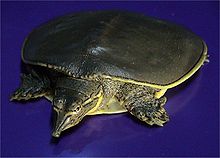Apalone
| Apalone Temporal range: Late Cretaceous - recent,
| |
|---|---|

| |
| Spiny softshell turtle, Apalone spinifera | |
| Scientific classification | |
| Domain: | Eukaryota |
| Kingdom: | Animalia |
| Phylum: | Chordata |
| Class: | Reptilia |
| Order: | Testudines |
| Suborder: | Cryptodira |
| Family: | Trionychidae |
| Subfamily: | Trionychinae |
| Genus: | Apalone Rafinesque, 1832 |
| Species | |
|
3 recognized species, see article. | |
| Synonyms | |
|
Mesodeca Rafinesque, 1832 | |
Apalone is a genus of turtles in the family Trionychidae. The three species of Apalone are native to freshwater habitats in North America; they are the only living softshell turtles from the Americas (other American softshell turtles are only known from fossil remains).[2]
Geographic range
[edit]Most Apalone species are restricted to the United States, though the range of the spiny softshell, A. spinifera, extends into southern Canada and northern Mexico.
Taxonomy
[edit]Apalone is a fairly new classification, resurrected by Meylan in 1987,[3] assigned to North American species of the genus Trionyx. They are still listed as Trionyx in some texts. (Trionyx now refers specifically to certain softshell species found mainly in Africa.)
Sexual dimorphism
[edit]Turtles of the genus Apalone exhibit marked sexual dimorphism. In carapace length, females grow to about twice the size of males. In males, the claws on the front feet are longer than those on the back feet, but in females, the claws on the back feet are longer. In males, the stout tail extends well beyond the posterior edge of the carapace, but in females, the relatively thinner tail barely reaches the edge of the carapace.[4]
Behavior
[edit]Apalone turtles are fast swimmers that chase down their prey in water. They feed mainly on fish. They also like the comfort of sand as their bedding.
Species
[edit]The following three species are recognized as being valid.[5]
- Apalone ferox (Schneider, 1783) – Florida softshell turtle - South Carolina, Georgia, Florida, and Alabama
- Apalone mutica (Lesueur, 1827) – smooth softshell turtle - United States, east of the Rocky Mountains
- Apalone spinifera (Lesueur, 1827) – spiny softshell turtle - Canada (southern Ontario and Quebec), most of the United States, and northeastern Mexico.
Nota bene: A binomial authority in parentheses indicates that the species was originally described in a genus other than Apalone.
References
[edit]- ^ Fritz, Uwe; Havaš, Peter (2007). Checklist of Chelonians of the World. Dresden: Museum für Tierkunde Dresden.
- ^ Vitek, Natasha S.; Joyce, Walter G. (2015). "A Review of the Fossil Record of New World Turtles of the Clade Pan-Trionychidae". Bulletin of the Peabody Museum of Natural History. 56 (2): 185–244. doi:10.3374/014.056.0204. ISSN 0079-032X. S2CID 86006102.
- ^ Meylan PA (1987). "The phylogenetic relationships of soft-shelled turtles (family Trionychidae)". Bull. American Mus. Nat. Hist. 186: 1-101.
- ^ Smith HM, Brodie ED Jr (1982). Reptiles of North America: A Guide to Field Identification. New York: Golden Press. 240 pp. ISBN 0-307-13666-3. (SOFTSHELL TURTLES—family Trionychidae, p. 30).
- ^ "Apalone ". The Reptile Database. www.reptile-database.org.
Further reading
[edit]- Rafinesque CS (1832). "Description of two new genera of Soft Shell Turtles of North America". Atlantic Journal and Friend of Knowledge 1: 64–65. (Apalone, new genus, p. 64).
External links
[edit]- Genus Apolone at The Reptile Database
- Tortoise.org Apalone entry
- Spiny Softshell Turtle - Apalone spinifera Species account from the Iowa Reptile and Amphibian Field Guide

